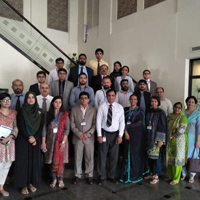[vc_row][vc_column][vc_column_text]
The Quality Assurance Agency of Higher Education Commission organized a 02 days activity for the Directors of QECs on 18- 19th April, 2018 at Margala Hotel, Islamabad. This activity was aimed to strengthen the Quality Assurance System in Pakistani Degree awarding institutions through Internal Quality Assurance Mechanism and External Quality Assurance Mechanism.
Dr Arshia Samin Naqvi, Director QEC represented Ziauddin University in the meeting.
First day of the meeting comprised of presentations of each university’s internal quality assurance practices by the QEC heads. Presentation of Ziauddin University was rated best and applauded because all the programs of ZU are accredited by the respective accrediting bodies. Second day of the activity included training and discussion on the revised Quality Assessment criteria of QECs developed by HEC, which was shared with all Degree Awarding Institutions to bridge the gap between Internal & External Quality Assurance System.
Important points on which deliberations were done during the two days are as follows:
- Strategic planning of each Degree Awarding Institution is of utmost importance and will carry high scores.
- In cases where some requirement is not available in the Act of a university, amendment to the Act is not mandatory. Approval from the Patron (Governor) is enough to fulfill the HEC requirement.
- Regarding faculty appointment: HEC advised to keep record of notifications for adoption of HEC/ accrediting body appointment criteria and hard copies of advertisements.
- For three mandatory evaluations i.e faculty and teacher evaluation by students and course evaluation by the respective faculty member, a password to the university evaluations link has to be shared with the HEC.
- For MPhil/ MS/ PhD programs:
- Act/ Charter of the university must approve of the program.
- NOC of accrediting body should be available.
- Curriculum of the program should be in line with the HEC requirements.
- Admission requirements must fulfill HEC criteria. In case an applicant falls short of some requirement deficiency courses are appreciated.
- Duration of the program and semester wise breakup of workload/ credit hours should be available.
- PhD faculty should be registered with HEC.
- Maximum time allowed for MPhil and PhD is inclusive of all the extensions given to a student. This should be strictly taken care of.
- PhD thesis review policy i.e by two foreign experts should be strictly followed. Purpose of this is to develop linkages with foreign universities by initiating joint research projects.
- One published paper will be accepted. Acceptance of a paper by a research journal does not fulfill the HEC requirement.
- Notifications of approval of program by statutory bodies are mandatory.
- Policies e.g freezing of semester policy should be available in hard copy.
- Anti plagiarism policy as a written document should be available and notified to all the stakeholders.
- For admission to MPhil/ MS programs 50% score in GAT and for PhD 70% score in National and 60% in international GRE is mandatory.
- Comprehensive exam after completion of 18 credit hour course work, is mandatory and passing in both Oral and written exam is required. Only 2 attempts are allowed in comprehensive exam.
- Emails may be used to send the thesis for review but personal email addresses shouldn’t be used. All correspondence should be done on official email addresses.
- Different nomenclatures shouldn’t be used in the same class of MS/MPhil (with or without thesis.) In case of MS without thesis, the student has to do a 6 credit hour research work to be able to apply for PhD.
- Each university must work on standardized course codes for their PG programs.
- HEC advised to highlight the research area of its PhD supervisors in the prospectus or on the website. Also mention the number of vacant seats with each supervisor. This will attract students having interest in the given area.
- Thesis writing workshops should be conducted at proposal writing stage.
- HEC also advises to improve facilities for PhD students e.g provide exclusive workstations in the library, PhD lounges for research students, employ peer learning/ mentoring methods.
[/vc_column_text][vc_gallery interval=”3″ images=”5420,5419,5418″ img_size=”full”][/vc_column][/vc_row]



